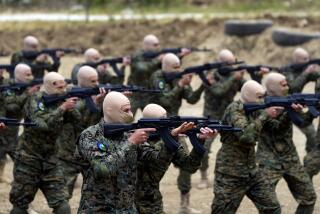Divided Loyalties Hobbling Radical Palestinians : Terrorism: Factions split over ties to Syria and Iran. The rift has shaken the organization led by Ahmed Jibril, prime suspect in the bombing of Pan Am Flight 103.
- Share via
DAMASCUS, Syria — Palestinian guerrilla leader Ahmed Jibril, a prime suspect in the 1988 bombing of Pan American Flight 103, has been hobbled by twisting loyalties that threaten full control of his radical organization, diplomatic and intelligence officials say.
Reports of dissension in the top circles of Jibril’s Popular Front for the Liberation of Palestine-General Command have been circulating for weeks in Syria, where the group has been based since its formation in 1968.
The trouble revolves around the group’s growing reliance on Iranian sources to fund its military operations, according to intelligence analysts in Damascus and in Washington. Meanwhile, the organization is under close watch by its Syrian hosts, who have been stung by association with the December, 1988, terrorist bombing that brought down Pan Am Flight 103 over Lockerbie, Scotland, killing 259 people aboard and 11 on the ground.
Investigation into the bombing continues, and no charges have been made in the British courts. However, a trail of evidence has been traced to known operatives of Jibril’s group. According to American officials, the Damascus government has pledged not to tolerate any acts of terrorism by Syrian-based guerrilla groups and to “punish” anyone who is accused on convincing evidence.
So far, there has been no direct Syrian move against Jibril, who is also known as Abu Jihad, and his estimated 500 guerrillas.
“Absolutely not,” said a Damascus-based diplomat of reports that the Palestinian radical has moved his base of operations from the outskirts of the Syrian capital to Lebanon’s Syrian-controlled Bekaa Valley.
Syria has been Jibril’s main sponsor since he founded his guerrilla command. The Jaffa-born Palestinian was trained in the Syrian army and helped lead the Syrian-backed Palestinian radical revolt against Yasser Arafat’s mainline Fatah guerrillas in Lebanon in the mid-1980s.
But intelligence sources inside Syria and abroad say that Jibril’s command of his organization has been challenged over the issue of the divided sponsorships of Syria and Iran.
“Syria has less hold over Jibril than at any point since his 1983 split with Arafat,” a top American counterterrorism official said in Washington.
Jibril has denied published reports that his guerrillas masterminded and carried out the Pan Am bombing and that he received money from Iranian sources who wanted retaliation for the felling of an Iranian airliner over the Persian Gulf during the Iran-Iraq War by a U.S. missile cruiser that mistakenly targeted the airliner as an F-14 jet.
Nevertheless, sources in Damascus and Washington said Jibril is receiving money from Iran, although conceding it is not clear which faction in the Tehran government, or outside it, is providing the funds.
“He’s following the Iranian agenda,” said a Damascus-based diplomat. “He’s the man chosen to carry out Iran’s dirty tricks.”
Jibril’s funding formerly came from Syria and Libya, but both countries have cut back on bankrolling outside radicals in the last two years.
“His leaning toward Tehran appears to be mainly linked to the financial issue,” said an American analyst. “(Libyan leader Moammar) Kadafi has cut back seriously on his funding.”
Meanwhile, Jibril poses a political and public relations problem for the government of Syrian President Hafez Assad. Commenting on Jibril’s reported absences from Damascus, a State Department official in Washington speculated that Assad is trying to squeeze Jibril from power “to get rid of the albatross of Pan Am 103.”
With Syria on notice that ever-increasing military support from the Soviet Union is no longer available, and with its own economy staggering, Assad’s government has taken a more moderate line in recent months. It has re-established relations with Egypt and put out economic feelers to the West, including the United States. Jibril and his radical Iranian connections are drags on the new image.
Within the group, according to Damascus sources, the contending power is Talal Najy, an East Bloc-educated Palestinian with administrative skills and a firm loyalty to Syria. In late February, according to Washington reports, a split of the executive committee was averted only when Najy was given control of the political apparatus of the guerrilla command, leaving Jibril to handle military operations. Syrian sources confirmed an informal division of powers.
One Western diplomat said that Najy was reported considering the diversion of the group’s resources to Iranian objectives, as opposed to basic anti-Israeli activities, a serious policy change.
The two men, however, are keeping their differences “under the surface,” said a well-informed Syrian observer. Both appeared last week at the Yarmouk refugee camp outside Damascus to mark the anniversary of the founding of the Popular Front for the Liberation of Palestine-General Command.
Jibril took the occasion to blister Arafat and threaten unspecified political targets. The PFLP-GC, he pledged, “will continue its operations, and this will be shown in the very near future.”
Williams reported from Damascus and Wright from Washington.
More to Read
Sign up for Essential California
The most important California stories and recommendations in your inbox every morning.
You may occasionally receive promotional content from the Los Angeles Times.













